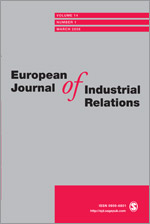
Towards a Europeanization of Wage Bargaining? Evidence from the Metal Sector
European trade unions have attempted to coordinate their bargaining strategies transnationally in order to counter downward pressures on wages. Such coordination is most feasible in broadly integrated and exposed sectors that have to face common competitive constraints on wages. This article investigates collectively negotiated wage increases in the metal sector in Belgium, the Netherlands and Germany. We assume a specific logic of transnational pattern bargaining, with Germany as the ‘anchor’ country. We investigate the emergence of a transnational wage coordination effect before and after institutions for the coordination of wage bargaining were established. Finally, we draw conclusions on prospects for wage bargaining coordination with further integration of Economic and Monetary Union.




